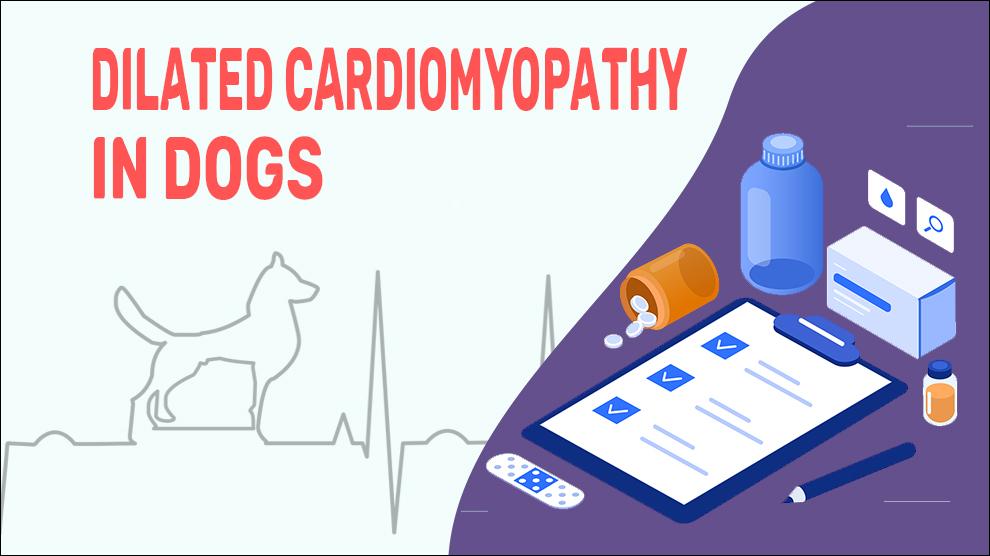Dilated cardiomyopathy (DCM) is an irregularity in the function of the heart, caused by thinning, stretching, and enlargement of heart chambers (ventricles). DCM is the most common type of nonischemic cardiomyopathy. This is characterized by enlargement and dilation of one or both of the ventricles (left ventricular or biventricular dilation) as well as systolic and diastolic dysfunction that is not explained by coronary artery diseases or any other abnormal conditions (for example, valvular heart disease, hypertension, etc)
Mostly DCM is an autosomally dominant inherited, progressive, inflammatory, and heterogeneous condition. The genetic basis of the condition depends on genes encoding structural components of the desmosome and sarcomere. Nongenetic forms of DCM can result from different aetiologies, including infections (mostly viral), inflammation of the myocardium, autoimmune or systemic endocrine diseases, and toxins or allergens.
The clinical presentation of DCM and heterogeneous aetiology make a timely and proper diagnosis more challenging.
DCM is a progressive deterioration that generally affects the chambers in the heart. Eventually, the thinning and enlargement of the ventricles result in the weakening of the heart muscle. The heart can no longer hold the unusual blood flow resulting in congestive cardiac failure.
Symptoms Of Dilated Cardiomyopathy
- Weakness
- Collapse
- Slow/fast/erratic heart rate
- Exercise intolerance
- Labored breathing
- Lack of appetite
- Increased respiratory rate
Treatment Options For Dilated Cardiomyopathy
The specific treatment depends on the underlying cause of the dilated cardiomyopathy.
- Diuretics (water pills): To reduce fluid buildup in the body by eliminating extra fluid and salt. spironolactone, furosemide etc.
- Heart valve surgery: To repair or replace the damaged or diseased heart valves.
- Congestive heart failure- an angiotensin-converting enzyme (ACE) inhibitor (benazepril, lisinopril, or enalapril), diuretics like spironolactone, furosemide, etc.
- Extra medications that might be used are sildenafil, valsartan, sacubitril, torsemide, etc.
Home Remedies For Dilated Cardiomyopathy
- Talk to Your Veterinarians and understand your pet’s treatment options.
- Pain can be so subtle in dogs –access your dog’s pain and watch out for any abnormal behavior.
- Don’t forget even sick dogs need a few low-stress activities and a lot of rest.
- Work with your vet to find the optimal dietary plan for your dog.
- Home remedies such as herbs, diet, and exercise will depend on your dog's age and stage of the disease they are in.
Prevention Of Dilated Cardiomyopathy
There are no dependable methods to prevent heart disease in dogs, particularly since few of the common types are hereditary. But you can take steps to help your dog live a healthy life.
Healthy diet: Always feed your pup a healthy diet that includes Omega-3 Fatty Acids (fish oil) and Taurine (amino acid).
Adequate exercise: Exercise is good for cardiac health. However, when your pup has been diagnosed with heart disease, make sure to limit strenuous exercises.
Affected Breeds Of Dilated Cardiomyopathy
Large Dog Breeds, Giant Dog Breeds, Boxer, Great Dane, Cocker Spaniel, Irish Wolfhound, Saint Bernard, Cavalier King Charles Spaniel, Chihuahua, Cocker Spaniel, Doberman Pinscher, Lhasa Apso, Old English Sheepdog, Toy Poodle, Samoyed, Schnauzer, Yorkshire Terrier
Additional Facts For Dilated Cardiomyopathy
1. Causes:
Cardiac causes of dilated cardiomyopathy disease include:
Congenital heart defects (especially Bicuspid aortic valve disease)
Heart muscle disease (such as hypertrophic cardiomyopathy )
Myocarditis (inflammation of the myocardium)
Severe valve leakage and enlargement of the cardiac chambers (chronic degenerative mitral valve disease)
Trauma to the heart muscle (such as a dog being hit by a car)
Age-related changes
Non-cardiac causes of dilated cardiomyopathy include:
Inflammation of the pancreas
Severe anemia (low red blood cell count)
Gastric dilatation-volvulus (stomach twists around filled fills with large amounts of air)
Muscular dystrophy
Anesthetic agents, toxins, and medications.
2. Types:
Left-sided congestive heart failure
This is the most common type of CHF in dogs. Dysfunction in the left ventricle - the main pumping power source of the heart is gradually weakened.
Right-sided congestive heart failure
This is caused by dysfunction in the right ventricle and its inability to pump an adequate amount of blood to the lungs.
Biventricular failure
This happens when both the left and right ventricles are not functioning properly.
3. Mortality:
The untreated DCM shows clinical signs usually within 6 months. Dogs with DCM have a more than 50% mortality rate by one year of age if left untreated.
After congestive heart failure has developed due to various causes, Life expectancy is variable and it is typically around 6-14 months.
4. Diagnosis:
- A complete blood count (CBC), chemistry profile
- X-ray
- Cardiac biomarker blood test - NTproBNP
- ECG (electrocardiograph) / echocardiogram
- Cardiac ultrasound
5. Prognosis:
The overall prognosis of infectious/ acute/ idiopathic DCM prognosis is excellent, with most dogs experiencing a complete recovery after appropriate treatment.
Veterinary cardiologists say that dogs with severe DCM are those having other heart defects that are likely to have developed in tandem with the defect itself.
Dogs with a severe defect will start to show symptoms within three years of age. Congestive heart failure may develop in DCM dogs once the heart gets weaker.
DCM is a hereditary condition that is considered to be the result of multiple genetic factors.
When To See A Vet
- Weakness
- Slow/fast/erratic heart rate
- Labored breathing
Food Suggestions For Dilated Cardiomyopathy
- Low carb, low fat, and high protein diet.
- Use no salts in food or cooking.
- Canned, frozen, and prepared pet foods are high in sodium.
- Fresh meats are usually low in sodium.
- Taurine, L-carnitine, Omega-3 Fatty Acids.
What to feed?
Conclusion
The prognosis for dilated cardiomyopathy in dogs depends on its severity and how early it was treated. The survival rate for dogs that undergo surgical repair for idiopathic DCM is good.
Obviously, recurrence of DCM is not possible after surgical procedures. Many dogs can live normal lives if they are without any other complications. Dogs with mild symptoms can be managed with medications.

















